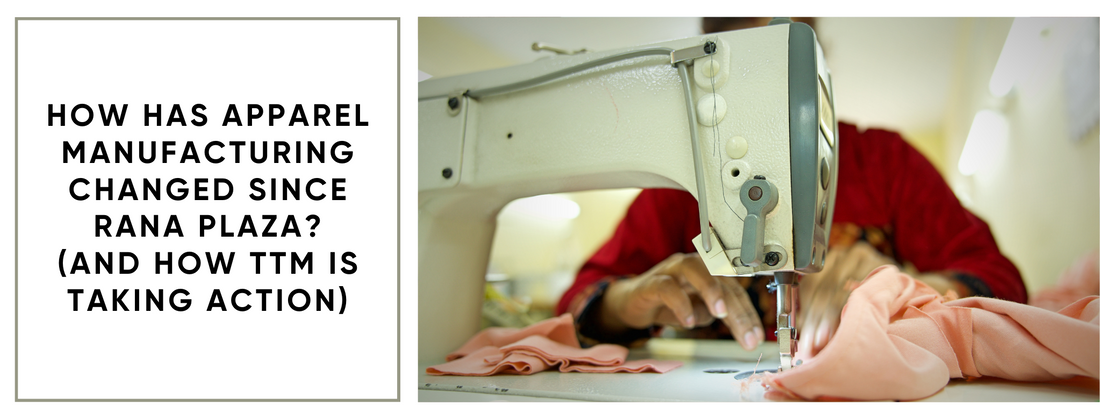
How Has Apparel Manufacturing Changed Since Rana Plaza? (And How TTM is Taking Action)
Share
This past month marks 10 years since the tragic Rana Plaza collapse.
For those who may not be aware, the Rana Plaza incident was a catastrophic garment factory disaster that occurred in Bangladesh, in April 2013. The eight-story building in Dhaka housed several factories that produced clothing for major global brands. Despite visible cracks in the structure, workers were ordered to continue working, and eventually, the building collapsed, killing 1,134 people and injuring over 2,500.
The incident shed light on the unsafe working conditions many garment workers in Bangladesh and other developing nations endure, including long hours, low wages, and unsafe working environments. It also brought attention to the lack of accountability and transparency in the global garment industry, as many of the brands that sourced from the Rana Plaza factories had not adequately monitored the working conditions of their suppliers.
Since the Rana Plaza tragedy, there has been increased attention and scrutiny on the garment industry, leading to some positive changes in policies and practices. Also, some brands have committed to improving working conditions and ensuring their suppliers meet certain ethical and safety standards, while advocacy groups and unions have pushed for better regulations and stronger labor rights protections.
Two major initiatives that were launched in response to the Rana Plaza tragedy were the Bangladesh Accord on Fire and Building Safety and the Alliance for Bangladesh Worker Safety.
The Bangladesh Accord on Fire and Building Safety was established in May 2013 by a coalition of international trade unions and leading clothing brands. The Accord is a legally binding agreement that commits signatory brands to work towards improving safety standards in Bangladeshi garment factories, while also providing workers with the right to refuse dangerous work. The Accord includes regular inspections of factories, remediation of safety hazards, and training for workers and management. The agreement has been signed by more than 200 brands, including H&M, Zara, and Primark.
The Alliance for Bangladesh Worker Safety was launched in July 2013 by a group of 26 North American retailers - including some of our clients! The Alliance is a five-year commitment to improve factory safety and working conditions in Bangladesh. Similar to the Accord, the Alliance involves factory inspections, remediation of safety hazards, and worker empowerment programs. After the Alliance expired in 2018, brands and corporations created Nirapon, a safety monitoring non-profit designed to continue the mission of The Alliance for Bangladesh Worker Safety using a holistic approach. Currently, they work with over 330 factories to support a culture of safety and educate employees on how to effectively prevent and control hazards and risks.
Overall, both initiatives have made significant progress in improving safety standards in Bangladeshi garment factories since the Rana Plaza tragedy. The Accord has completed the remediation of safety hazards in over 85% of the factories it covers, while the Alliance has completed safety training for over two million workers. However, concerns remain about the long-term sustainability of the reforms and the need for continued monitoring and accountability to ensure that workers are protected.
At TO THE MARKET, the safety and well-being of the workers in our supplier network is not only a top priority, but a core element of our mission. Baked into our business model are our guiding principles, which include our foundational beliefs about workplace standards, corporate citizenship, and worker treatment.
As a further commitment to worker safety, we hired a Country Coordinator for Bangladesh to oversee our factories in the region. This additional layer of oversight will help to ensure that our suppliers meet our ethical standards and comply with local labor laws. Through our ongoing commitment to supply chain monitoring, transparency, and accountability, we have the power to proactively prevent any further devastating incidents like the Rana Plaza collapse.
While we celebrate the progress made towards a more ethical apparel manufacturing industry, we recognize there is still much work that remains to be done to verify the health and safety of garment workers. The Rana Plaza tragedy continues to serve as a stark reminder of the importance of garment industry reform and the critical need to protect the rights and well-being of the workers who produce the clothes we wear.
